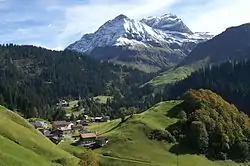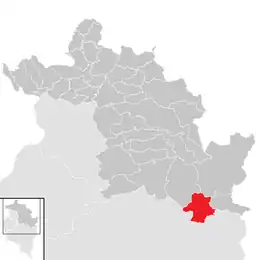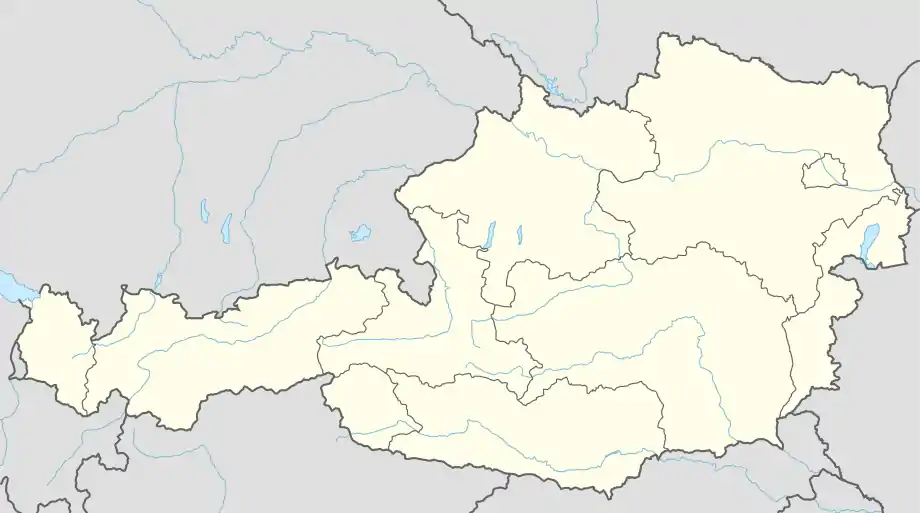Schröcken | |
|---|---|
 | |
 Coat of arms | |
 Location in the district | |
 Schröcken Location within Austria | |
| Coordinates: 47°15′00″N 10°05′00″E / 47.25000°N 10.08333°E | |
| Country | Austria |
| State | Vorarlberg |
| District | Bregenz |
| Government | |
| • Mayor | Herbert Schwarzmann |
| Area | |
| • Total | 23.43 km2 (9.05 sq mi) |
| Elevation | 1,269 m (4,163 ft) |
| Population (2018-01-01)[2] | |
| • Total | 224 |
| • Density | 9.6/km2 (25/sq mi) |
| Time zone | UTC+1 (CET) |
| • Summer (DST) | UTC+2 (CEST) |
| Postal code | 6888 |
| Area code | 05519 |
| Vehicle registration | B |
| Website | www.warth-schroecken.com |
Schröcken is a municipality in the district of Bregenz, in the westernmost Austrian state of Vorarlberg.
Geography
Schröcken is in the Austrian Alps, at an altitude of 1,269 meters. 12.4% of the area are forested, 39.4% Alpine area.
History
The region around Schröcken was first populated around 1300 CE by German-speaking people known as the Walser, who came to Austria in from the Bernese Oberland (highlands) located in the southern part of the Canton of Bern, Switzerland. The town became part of a regional administrative area called Tannberg in 1806. From 1805 to 1814, the town was under the jurisdiction of the Free State of Bavaria. Later it reverted to become part of the Austro-Hungarian Habsburg Empire, and in 1861 was integrated into the newly founded state of Vorarlberg, Austria. From 1945 to 1955, Schröcken was part of the French occupation zone in Austria.
Name
The original name was "Girsboden". "Schröcken" first appeared in the early 17th century.
Population
| Year | Pop. | ±% |
|---|---|---|
| 1869 | 170 | — |
| 1880 | 177 | +4.1% |
| 1890 | 142 | −19.8% |
| 1900 | 133 | −6.3% |
| 1910 | 149 | +12.0% |
| 1923 | 130 | −12.8% |
| 1934 | 164 | +26.2% |
| 1939 | 250 | +52.4% |
| 1951 | 207 | −17.2% |
| 1961 | 196 | −5.3% |
| 1971 | 220 | +12.2% |
| 1981 | 214 | −2.7% |
| 1991 | 239 | +11.7% |
| 2001 | 233 | −2.5% |
| 2011 | 229 | −1.7% |
Politics
The political administration body consists of a 9-member council and a mayor.
Sights
Church of Our Lady of the Assumption The first church of Schröcken was built in 1639. The church increased its membership from 1726 to 1732, but the building was destroyed by fire in 1863. A rebuilding effort took place between 1864 and 1867, when it was re-consecrated. The church is surrounded by a walled cemetery.
Chapel of the Annunciation 18th century neo-Gothic chapel, consecrated in 1779.
Economy
Tourism is the main economic enterprise, with an emphasis on outdoor activities including, skiing, hiking, and other mountain sports.
Transportation
There is public transportation provided by Wälderbus 40 or 42, which connects with the broader Vorarlberg-Austrian-European network. The main road is the Bregenzerwald Bundesstraße 200.
Education
The town has a primary school and a kindergarten.
Climate
| Climate data for Schröcken (1981–2010) | |||||||||||||
|---|---|---|---|---|---|---|---|---|---|---|---|---|---|
| Month | Jan | Feb | Mar | Apr | May | Jun | Jul | Aug | Sep | Oct | Nov | Dec | Year |
| Record high °C (°F) | 14.0 (57.2) |
15.5 (59.9) |
18.0 (64.4) |
21.0 (69.8) |
27.5 (81.5) |
30.0 (86.0) |
31.5 (88.7) |
29.6 (85.3) |
27.5 (81.5) |
24.4 (75.9) |
20.0 (68.0) |
20.0 (68.0) |
31.5 (88.7) |
| Mean daily maximum °C (°F) | 2.5 (36.5) |
2.8 (37.0) |
5.5 (41.9) |
9.1 (48.4) |
14.4 (57.9) |
17.3 (63.1) |
19.6 (67.3) |
19.1 (66.4) |
15.7 (60.3) |
12.2 (54.0) |
6.1 (43.0) |
2.9 (37.2) |
10.6 (51.1) |
| Daily mean °C (°F) | −2.1 (28.2) |
−2.0 (28.4) |
0.6 (33.1) |
4.1 (39.4) |
9.2 (48.6) |
12.2 (54.0) |
14.4 (57.9) |
13.8 (56.8) |
10.4 (50.7) |
7.1 (44.8) |
1.6 (34.9) |
−1.1 (30.0) |
5.7 (42.3) |
| Mean daily minimum °C (°F) | −5.4 (22.3) |
−5.4 (22.3) |
−2.7 (27.1) |
0.7 (33.3) |
5.2 (41.4) |
8.0 (46.4) |
10.4 (50.7) |
10.1 (50.2) |
7.1 (44.8) |
3.9 (39.0) |
−1.3 (29.7) |
−4.1 (24.6) |
2.2 (36.0) |
| Record low °C (°F) | −26.5 (−15.7) |
−24.0 (−11.2) |
−18.0 (−0.4) |
−11.3 (11.7) |
−4.5 (23.9) |
−2.0 (28.4) |
−0.2 (31.6) |
0.0 (32.0) |
−1.5 (29.3) |
−10.0 (14.0) |
−17.0 (1.4) |
−21.0 (−5.8) |
−26.5 (−15.7) |
| Average precipitation mm (inches) | 162 (6.4) |
156 (6.1) |
192 (7.6) |
140 (5.5) |
179 (7.0) |
229 (9.0) |
268 (10.6) |
256 (10.1) |
184 (7.2) |
130 (5.1) |
157 (6.2) |
171 (6.7) |
2,224 (87.6) |
| Average relative humidity (%) (at 14:00) | 60.4 | 59.1 | 57.2 | 52.6 | 53.2 | 58.2 | 57.6 | 60.2 | 60.6 | 60.4 | 65.5 | 66.2 | 59.3 |
| Source: Central Institute for Meteorology and Geodynamics[3][4][5][6][7] | |||||||||||||
| Climate data for Schröcken (1971–2000) | |||||||||||||
|---|---|---|---|---|---|---|---|---|---|---|---|---|---|
| Month | Jan | Feb | Mar | Apr | May | Jun | Jul | Aug | Sep | Oct | Nov | Dec | Year |
| Record high °C (°F) | 14.0 (57.2) |
15.5 (59.9) |
18.0 (64.4) |
23.0 (73.4) |
26.0 (78.8) |
28.0 (82.4) |
31.5 (88.7) |
29.5 (85.1) |
29.2 (84.6) |
23.0 (73.4) |
20.0 (68.0) |
18.5 (65.3) |
31.5 (88.7) |
| Mean daily maximum °C (°F) | 2.6 (36.7) |
3.0 (37.4) |
5.3 (41.5) |
7.9 (46.2) |
13.6 (56.5) |
16.4 (61.5) |
18.8 (65.8) |
18.8 (65.8) |
15.6 (60.1) |
11.6 (52.9) |
5.7 (42.3) |
3.3 (37.9) |
10.2 (50.4) |
| Daily mean °C (°F) | −1.8 (28.8) |
−1.7 (28.9) |
0.5 (32.9) |
3.2 (37.8) |
8.4 (47.1) |
11.2 (52.2) |
13.5 (56.3) |
13.4 (56.1) |
10.2 (50.4) |
6.6 (43.9) |
1.3 (34.3) |
−0.7 (30.7) |
5.3 (41.5) |
| Mean daily minimum °C (°F) | −5.2 (22.6) |
−5.0 (23.0) |
−2.8 (27.0) |
−0.1 (31.8) |
4.6 (40.3) |
7.2 (45.0) |
9.6 (49.3) |
9.7 (49.5) |
6.8 (44.2) |
3.5 (38.3) |
−1.8 (28.8) |
−4.0 (24.8) |
1.9 (35.4) |
| Record low °C (°F) | −26.5 (−15.7) |
−24.0 (−11.2) |
−23.5 (−10.3) |
−11.5 (11.3) |
−7.8 (18.0) |
−1.0 (30.2) |
−0.2 (31.6) |
0.0 (32.0) |
−1.5 (29.3) |
−11.0 (12.2) |
−17.0 (1.4) |
−21.6 (−6.9) |
−26.5 (−15.7) |
| Average precipitation mm (inches) | 174.4 (6.87) |
161.8 (6.37) |
180.0 (7.09) |
162.3 (6.39) |
172.4 (6.79) |
252.1 (9.93) |
286.5 (11.28) |
233.7 (9.20) |
183.0 (7.20) |
138.3 (5.44) |
178.5 (7.03) |
185.8 (7.31) |
2,308.8 (90.90) |
| Average snowfall cm (inches) | 170.7 (67.2) |
156.8 (61.7) |
179.8 (70.8) |
91.5 (36.0) |
20.5 (8.1) |
4.3 (1.7) |
0.0 (0.0) |
0.5 (0.2) |
2.4 (0.9) |
16.9 (6.7) |
97.5 (38.4) |
175.1 (68.9) |
916.0 (360.6) |
| Average precipitation days (≥ 1.0 mm) | 12.7 | 11.7 | 14.3 | 14.7 | 16.2 | 18.0 | 17.2 | 16.3 | 12.8 | 11.5 | 12.8 | 13.3 | 171.5 |
| Average relative humidity (%) (at 14:00) | 59.9 | 57.6 | 56.0 | 53.4 | 52.1 | 57.6 | 56.9 | 58.6 | 58.7 | 58.9 | 65.8 | 63.4 | 58.2 |
| Source: Central Institute for Meteorology and Geodynamics[8] | |||||||||||||
See also
References
- ↑ "Dauersiedlungsraum der Gemeinden Politischen Bezirke und Bundesländer - Gebietsstand 1.1.2018". Statistics Austria. Retrieved 10 March 2019.
- ↑ "Einwohnerzahl 1.1.2018 nach Gemeinden mit Status, Gebietsstand 1.1.2018". Statistics Austria. Retrieved 9 March 2019.
- ↑ "Klimamittel 1981–2010: Lufttemperatur" (in German). Central Institute for Meteorology and Geodynamics. Archived from the original on 21 October 2019. Retrieved 19 November 2019.
- ↑ "Klimamittel 1981–2010: Niederschlag" (in German). Central Institute for Meteorology and Geodynamics. Archived from the original on 29 December 2014. Retrieved 19 November 2019.
- ↑ "Klimamittel 1981–2010: Schnee" (in German). Central Institute for Meteorology and Geodynamics. Archived from the original on 29 December 2014. Retrieved 19 November 2019.
- ↑ "Klimamittel 1981–2010: Luftfeuchtigkeit" (in German). Central Institute for Meteorology and Geodynamics. Archived from the original on 21 October 2019. Retrieved 19 November 2019.
- ↑ "Klimamittel 1981–2010: Strahlung" (in German). Central Institute for Meteorology and Geodynamics. Archived from the original on 29 December 2014. Retrieved 19 November 2019.
- ↑ "Klimadaten von Österreich 1971–2000 – Vorarlberg-Schröcken" (in German). Central Institute for Meteorology and Geodynamics. Archived from the original on 12 October 2019. Retrieved 28 October 2019.
- (in German) Schröcken